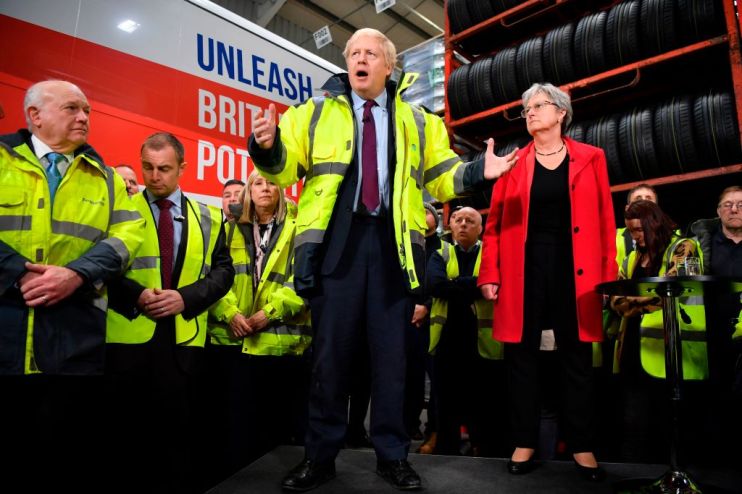So you’ve won over Workington Man — what next?

What do you do if you’re a Conservative leader whose flagship policy has split your party down the middle, with the result that you lost your working majority live on air as a coterie of former allies quit in protest?
Answer: cast your net further afield.
This is the Tories’ “Workington Man” strategy — the bid to seduce Leave voters in Labour’s traditional heartlands in the north and Midlands with the promise of delivering Brexit. And it seems to be working. While there is still a huge amount of variation in the polls, all indicate a Conservative majority of some degree, while Labour has been put on the back foot.
Boris Johnson’s trip to Grimsby and elsewhere in the north-east on Monday may not have gone entirely smoothly, but as Will Tanner, political strategist and director of the think tank Onward, pointed out, his message is resonating. For people who have voted Labour all their lives, in seats that have never turned blue, the Prime Minister is proving surprisingly popular.
According to Tanner: “Brexit has twisted the kaleidoscope and Mr Corbyn’s move towards a metropolitan and liberal posture alienates its provincial, culturally conservative base.” He may well be right.
However, as Conservatives migrate north to hoover up these floating votes, they too are abandoning their usual hunting ground, particularly the areas around the globalised business mecca that is London and the south-east.
This has no doubt been priced in to the Tory strategy. For all that Labour may appear too “liberal” for its northern voters, economic free-marketeers are hardly going to find an alternative home with John McDonnell’s agenda of dismantling the City and putting the state in control of vast swathes of industry.
The idea that the business community could defect and vote for a financial transaction tax and nationalised broadband scheme is clearly deemed remote enough that the Conservatives can take their traditional base for granted.
And in this election, they are probably right: Boris “f*ck business” Johnson is still a far better bet than Jeremy “We’re a threat” Corbyn.
But what happens next? When the votes are counted and the Conservative majority has been won, where does the party go? How does it govern, once it is relying on seats that are far away in both geography and outlook from where it has focused over the past decade?
If this campaign offers any indication, expect a shift state-wards.
Whereas once Brexit represented the chance to break free of lethargic EU bureaucracy and let competition reign supreme, the message has morphed. Two weeks ago, the Prime Minister was extolling the virtues of Brexit making it “faster and easier” for the government to step in and protect jobs and uncompetitive industries in the UK, liberated from EU state aid rules.
And far from using our newfound freedom to strike deals with the rest of the world and become a truly “global Britain”, apparently Brexit is now an opportunity to “back British businesses by ensuring the public sector buys British”.
Such a message might appeal to the specific demographic the Tories are targeting (the Workington Men, if you want to be reductive), but it leaves the classical liberals who were hoping we could become a free-market powerhouse on the world stage with little to shout about.
Or look at the decision to focus on the NHS. This is traditionally solid Labour terrority — expect the usual series of soundbites out today with the standard message about how we have just 24 hours to save our health service. But the Conservatives launched their election campaign with the promise of new hospitals and thousands of extra nurses, fighting the issue on Labour ground.
They know that in those key marginals, the NHS amounts to a national religion. All ideas of reforming it, of increasing private provision, or of having a sensible conversation about what it should be for and how it can adapt to cope with the increased demand of an ageing population, have been banished. A liberal, pro-market vision for the future of the NHS is not what Workington Man wants to hear.
Even on immigration, liberals are disappointed. While not as self-defeating as Theresa May’s obsession with cutting net migration at all costs, the points-based system unveiled last week puts another layer of Home Office bureaucracy over the visa process, and leaves it up to the government rather than businesses to decree which skills mark an individual out as deserving of entry.
Home secretary Priti Patel couldn’t resist promising that the new system would also help reduce overall numbers, while the Prime Minister himself wrote a deeply dismissive op-ed vowing to end EU migrants’ ability to “treat the UK as if it’s part of their own country”.
They know, as does CCHQ, that cutting immigration is a bigger concern for the Tories’ new targets than ensuring that businesses can hire the people they need.
Of course, many promises are made on the campaign trail only to be watered down once the election has been won. But if Boris finds himself in office only due to a handful of hitherto disregarded seats, expect the interests of those places to play a part in future Conservative policy. The party will adapt to accommodate them, and the next election will be fought with their priorities in mind.
At which point, liberals, business leaders, and global citizens who have made Britain home for themselves and their companies would be forgiven for wondering whether this can still be considered the party for them.
Main image credit: Getty